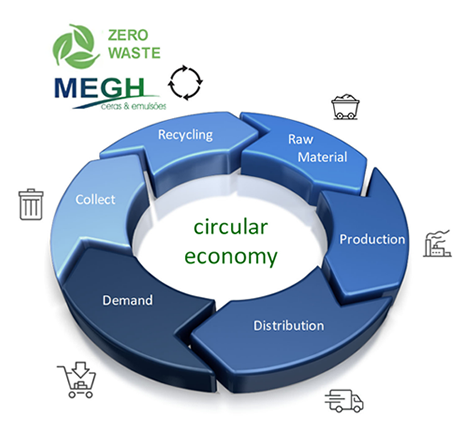Sustainability: The global challenge of plastic
It’s an alarming fact: approximately 85% of plastic packaging worldwide ends up in landfills. In the United States, the largest producer of post-consumer plastics in the world, only 5% of the 50 million tons of plastic waste discarded by households were recycled, according to reports from environmental NGOs.
With the prediction that plastic production could triple by 2060, it’s clear that these materials, mainly derived from oil and gas, will significantly contribute to carbon pollution, driving climate change.
The overwhelming majority of plastic waste ends up in landfills and the oceans, causing serious impacts on marine life. This is a global challenge that requires immediate and sustainable actions.
MEGH – Transformative technology for a sustainable future
In the innovative technology developed by us, recycled PE and PP plastic does not return to the original market, namely the plastics transformation. Instead, it is reinvented as a new material – a synthetic wax, following a path to a new production chain.
Thanks to this revolutionary approach, the new products, synthetic waxes, have an essential characteristic: they are biodegradable in a short period when reintroduced into nature. This completes a cycle of renewal, ensuring full compatibility with the environment. It’s the technology that is shaping the sustainable future we seek.
 Scan the QR code and enter the world of biodegradable polyolefin waxes. Together, we are shaping a greener future.
Scan the QR code and enter the world of biodegradable polyolefin waxes. Together, we are shaping a greener future.
Environmental commitment: Shaping a sustainable future
At MEGH, environmental concern is a fundamental aspect of our history, especially concerning the production of synthetic waxes derived from polyethylene and polypropylene.
Our research and development efforts have always been oriented towards finding cleaner and more efficient technologies to enhance the entire production chain.
The debate about the environmental impact of plastic waste is an ongoing agenda. Questions have arisen regarding how long it takes for polyethylene resin to decompose, with plastic bags made of LDPE taking up to 150 years to disappear. However, when buried, this durability can be even longer, as microorganisms do not have effective mechanisms for decomposition, potentially reaching 100 to 400 years.
The crux of the matter is that most plastics are not biodegradable, making PE recycling one of the most complex challenges in the realm of plastic materials. We are committed to addressing these challenges to build a sustainable future.
Chemical recycling: Turning challenges into solutions
In pursuit of the circular economy, MEGH adopts an innovative process: the chemical recycling of plastic materials. This method involves the transformation of these materials into new chemical substances through controlled catalytic depolymerization.
Focusing on post-consumer plastic resins, which arise when plastic products reach the end of their useful life and become solid waste, we use the acronym PCR, which stands for “Post-Consumer Recycled,” to describe the resins obtained from the recycling of plastic raw materials previously used by consumers.
While recycling is a sustainable and circular approach, currently, when it comes to polyethylene and polypropylene, we face significant challenges in addressing the growing plastic crisis. Furthermore, post-consumer recycled plastic resin (PCR) is often affected by competition from virgin plastic, especially when its cost is equal to or lower, thus limiting the market for recycled materials.
This creates competition within the plastic processing market between virgin resins and recycled materials. We are committed to overcoming these challenges and transforming the plastics industry through innovation.
![]()
Circular economy: Maximizing value and minimizing waste
The circular economy is a concept based on minimizing waste and residues. When a product reaches the end of its useful life, the idea is to keep its components within the economic cycle whenever possible, through recycling. This process allows these components to be reused, adding more value to the production chain.
ESG commitment: Environment, Society and Governance
The acronym ESG represents fundamental principles that every responsible company should adopt. It encompasses three essential areas:
Environmental: Commitment to environmental preservation and the promotion of sustainability.
Social: Responsible and ethical engagement in society, valuing well-being and equality.
Governance: Transparent and ethical business management practices.
At MEGH, we embrace ESG principles as an integral part of our mission. We are committed to making a difference not only in the business sector but also in the world we live in.
MEGH's Sustainable Commitment
At MEGH, we believe that our actions should extend beyond the business world. We are committed to making a positive difference in the environment we live in. Here are some of our initiatives:
Our mission goes beyond the products we manufacture; it involves building a more sustainable future for all.



